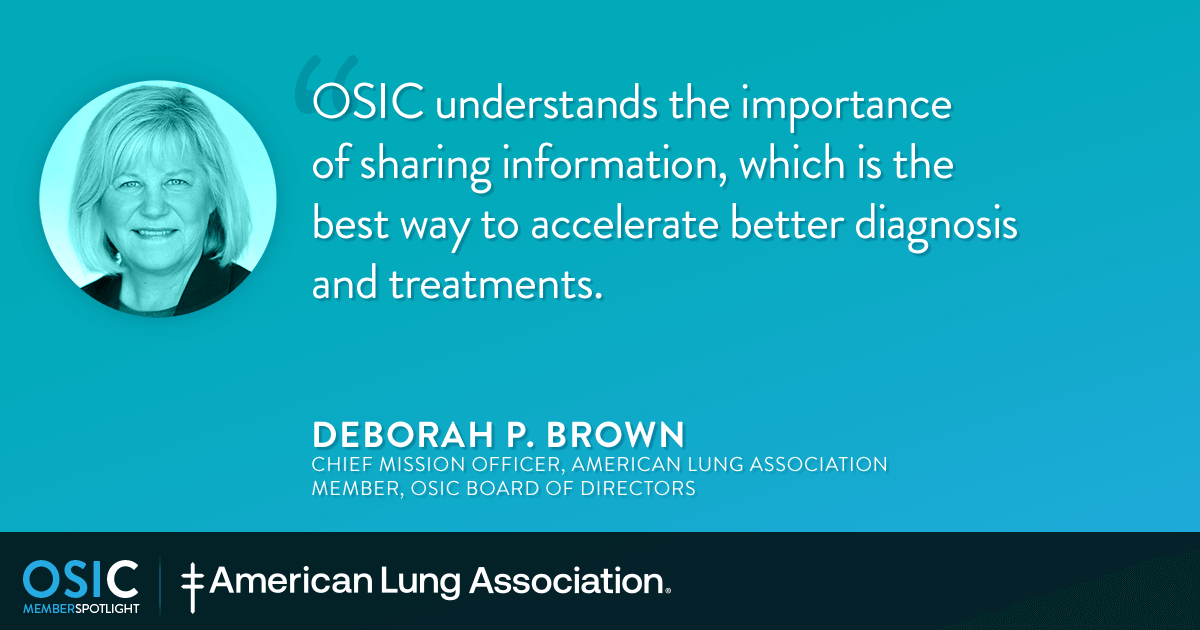A Q&A with Deborah P. Brown
Founded more than 115 years ago by a group of volunteers dedicated to ending the lung health threat at the time — tuberculosis — today, the American Lung Association is the leading organization working to save lives by improving lung health and preventing lung disease.
The non-profit has extended its original mission to other respiratory diseases and is focused on the following four strategic imperatives: to defeat lung cancer; to champion clean air for all; to improve the quality of life for those with lung disease and their families; and to create a tobacco-free future. More than 20 million people each year are helped by American Lung Association programs and initiatives. Thanks to its donors, volunteers, program and event participants, and staff, it is America's trusted source for lung health education, lung disease research, support, programs, services and advocacy. We caught up with OSIC Board Member Deborah P. Brown, the American Lung Association’s chief mission officer, about the importance of collaboration in the fight against IPF and ILDs, and why a global approach to sharing information will ultimately be life changing for patients. Following is an excerpt from our conversation.
What drew the American Lung Association to OSIC? What do you believe is different about our approach?
OSIC understands the importance of sharing information, which is the best way to accelerate better diagnosis and treatments. What makes its approach different is the worldwide collaboration that focuses on IPF and other ILDs. Currently, most treatment centers have a limited number of patients and, consequently, limited data sources. This global approach allows a bigger picture review for experts and information.
What unique perspective does your organization bring to OSIC?
The American Lung Association is a patient advocacy-based organization. We work with individuals and their families every day guiding them through disease related needs. We work to educate individuals and caregivers about health care access, screening, diagnosis and treatment. We explain what this means for them and their disease. We assist with questions they should be speaking to their health care provider about. We often provide a social support either in person or online. We want individuals and caregivers to be well educated so they can make the best health care decisions based on science and best practices.
How do you think the OSIC Data Repository will help contribute to the fight against IPF, ILDs and other respiratory conditions?
The images in the OSIC Data Repository are from around the world, and hold the potential to discover digital biomarkers for ILDs and, potentially, other respiratory diseases as well. The more researchers are aware of the repository, the more they will look to utilize its data. This work will be life changing for patients as it will ultimately assist in finding the best way to diagnose, manage and treat these diseases.
Why should people join OSIC? What is the value besides the data itself?
Individuals should join OSIC to be part of the solution for patients with IPF and ILDs. The value of OSIC is the networking with experts across the world. The individuals involved understand that the importance of collaboration and sharing information, instead of trying to find new tools and treatments on their own, is the way to go.
For more information about the American Lung Association, or to support the work it does, call 1-800-LUNGUSA (1-800-586-4872) or visit: Lung.org.
|
Get the latest OSIC news delivered right to your inboxNo spam. Just news.
By clicking the 'Subscribe to OSIC News' button, you consent to receive news and promotional materials from OSIC and agree to the processing of your personal data for this purpose as outlined in our Privacy Policy. You can withdraw your consent at any time.
|
Copyright © 2024 Open Source Imaging Consortium (OSIC). All rights reserved.



 RSS Feed
RSS Feed

